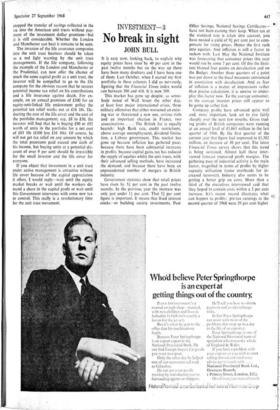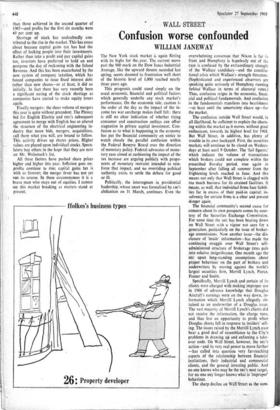No break in sight
INVESTMENT— 3 JOHN BULL
It is easy now, looking back, to explain why equity prices have risen by40 per cent in the past twelve months but on the way up there have been many doubters and I have been one of them. Last October, when I started my first portfolio in these columns I did so nervously, figuring that the Financial Times index would run between. 380 and 410. It is now 509.
This market has gone up despite, as some- body noted of Wall Street the other day, at least four major international crises, three military offensives that either worsened an exist- ing war or threatened a new one, serious riots and an important election in France, two assassinations . . . The British list is equally bearish : high Bank rate, credit restrictions, above average unemployment, dividend limita- tion, a Labour government. This market has gone up because inflation has gathered pace; because there have been substantial increases in profits; because capital gains tax has reduced the supply of equities whilst the unit trusts, with their advanced selling methods, have increased the demand; and because there have been an unprecedented number of mergers in British industry.
Government statistics show that retail prices have risen by 54 per cent in the past twelve months. In the previous year the increase was only just under 1-1 per cent. That 51 per cent figure is important. It means that fixed interest stocks—or building society investments, Post Office Savings, National Savings Certificates— have not been earning their keep. When tax at the standard rate is taken into account, you have needed a yield of 91 per cent just to com- pensate for rising prices. Hence the first rush into equities. And inflation is still a factor to reckon with. Last May the National Institute was forecasting that consumer prices this year would rise by some 7 per cent. Of this the Insti- tute blamed four points on devaluation and on the Budget. Another three quarters of a point was put down to the fiscal measures announced in association with devaluation. And as fear of inflation is a matter of impressions rather than precise calculation, it is unwise to under- play this factor now. To the average consumer, to the average investor prices still appear to be going up rather fast.
Company profits have advanced quite well and, more important, look set to rise fairly sharply over the next few months. Gross trad- ing profits of British companies were running at an annual level of £1,063 million in the last quarter of 1966. By the first quarter of the current year that figure had improved to £1,382 million, an increase of 30 per cent. The latest Financial Times survey shows that this trend is being sustained. Almost half those inter- viewed forecast improved profit margins. The gathering pace of industrial activity is the main factor, magnified in terms of profits by higher capacity utilisation (same overheads for in- creased turnover). Industry also seems to be getting a better grip on costs. More than a third of the executives interviewed said that they hoped to contain costs within a 3 per cent increase. Ices recent record illustrates what _Tr can happen to profits: pre-tax earnings in the second quarter of 1968 were 39 per cent higher 1.k. than those achieved in the second quarter of 1967—and profits for the first six months were 49 per cent up.
Shortage of stock has undoubtedly con- tributed to the rise in the market. This has come about because capital gains tax has had the effect of locking people into their investments. Rather than take a profit and pay capital gains tax, investors have preferred to hold on and postpone the day of reckoning with the Inland Revenue. And this has been exacerbated by the new system of company taxation, which has forced companies to issue fixed interest debt rather than new shares—or at least, it did so initially. In fact there has very recently been a significant easing of the stock shortage as companies have started to make equity issues again.
Finally mergers : the sheer volume of mergers this year is quite without precedent. The Plessey bid for English Electric and GEC'S subsequent agreement to merge with English has so altered the structure of the electrical engineering in- dustry that more bids, mergers, acquisitions, call them what you will, are bound to follow. This activity drives up shares prices. Higher values are placed upon individual stocks. Specu- lators buy others in the hope that they are next on Mr. Weinstock's list.
All these factors have pushed share prices higher and higher this year. Inflation goes on; profits continue to rise; capital gains tax is with us forever; the merger fever has not yet run its course. In these circumstances it is a brave man who stays out of equities. I cannot see this market breaking as matters stand at present.











































 Previous page
Previous page